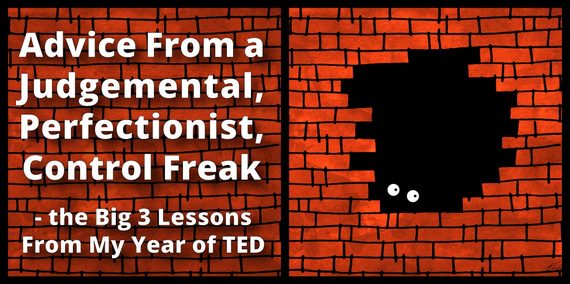
Image from My Year of TED by Matthew Dunn
TED, I'm sure you've heard of it; that website that shares all of those inspirational talks. It stands for Technology, Entertainment and Design, and has the mission of ideas worth spreading. In November 2011, I became possibly the weirdest TED enthusiast on the planet, by starting a year long self-development program I created called My Year of TED. During the course of that year, I implemented the wisdom of 54 TED Talks into my life, by completing 21 30-day activities.
I wanted to be less of a judgmental, perfectionist, control freak... and finally work out what I wanted to do with my life. The project gave me more than I could ever have imagined, or hoped for, but there are three fundamental lessons from My Year of TED that I think everyone should apply to their own lives. They are a great start to improving your mental health and general happiness.
Be kind to yourself
What's your internal critic like? Mine was a nasty b*tch; I definitely bore the brunt of my judgemental, perfectionist nature. I avoided risk, for fear of failing and knowing she would constantly remind of any shortcomings. I couldn't even celebrate my achievements for more than brief moments, as she was always quick to remind me of any mistakes and failings that went into them.
Through a range of activities, based on talks from Brené Brown, Eve Ensler, Karen Armstrong and others; I discovered the skills of self-compassion and self-kindness; regaining an overall confidence in my own abilities. I also learned that my internal critic thought she was protecting me, misguided as her methods were; we've agreed to change tactics.
I think she'll always be there, but my first impulse now is to be kind to myself when something goes wrong - and that has a flow on effect to how I react with other people as well.
You are never alone
You are unique, but there are a lot of thoughts, feelings and experiences that you share with other people. The internal critic is just one of many failings we all share, to some degree. I find that it helps to know other people understand your brokenness. It is one of the powerful aspects of TED, as a platform for sharing the brokenness and normalising thoughts, feelings and experiences that bring about shame and isolation.
I believe that a willingness to embrace vulnerability and share our fears, faults and failings is becoming the defining characteristic of the 21st century.
For example, have you heard of Imposter Syndrome? It's that feeling you get that people will work out that you are a fraud, even though you are very capable at what you do. It's a very real thing that a lot of people experience, and knowing that makes it a little easier.
Through TED, speakers have shared heartbreaking stories of mental health issues, homelessness, and even suicide attempts - thank you JD Schramm. These talks are courageous actions that help others know they aren't alone, and create a greater understanding in those who have never experienced these things for themselves. Even simpler talks, like Susan Cain on introversion, Elizabeth Gilbert discussing the creative genius and Kathryn Schulz on regrets - exposed moments that helped me understand myself better, and helped me remember that I am never truly alone in my brokenness - neither are you.
You can't be intentional without a destination
Simply put, if you don't know where you want to go or what you want your life to look like, how do you expect to make the right decisions to get you there? As a control freak, I was appalled to discover how passive I had been in the big decisions in my life; my biggest regrets were from decisions I didn't make, or that I allowed others to make for me.
Of course, this makes complete sense since I didn't know where I wanted to go. As this snippet from Lewis Carroll's Alice in Wonderland explains:
Alice: "Would you tell me, please, which way I ought to go from here?"
Cheshire Cat: "That depends a good deal on where you want to get to."
Alice: "I don't much care where -"
Cheshire Cat: "Then it doesn't matter which way you go."
Even if you don't yet understand the exact destination, or what you want to give the world, you can start to define the things that are important to you. Knowing your top ten values and what success looks like in the most important areas of your life, are two areas I would recommend. Why? Because:
- Understanding your values reduces that chances of significantly compromising them, which always ends badly.
- Defining success reduces that other destructive human behaviour, constantly comparing ourselves to others - Alain de Botton explains it well in his TED Talk on success.
I learned a lot from My Year of TED, but I think that these are the big three, and a great place to start. You will become a healthier and happier person if you can work towards developing the skills and understanding to:
- be kind to yourself -- you aren't the person your internal critic claims you are
- know you are never alone -- other people do understand your fears and brokenness
- know your values and concepts of success -- so you can make intentional choices.
As a recovering judgemental, perfectionist, control freak; I can tell you that life is much more enjoyable if you can get there.